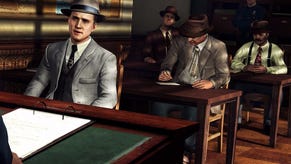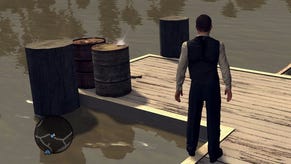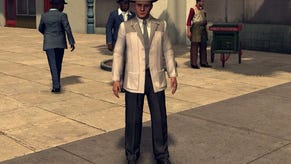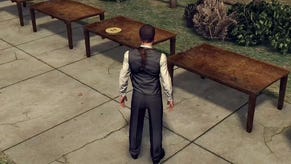Team Bondi - The First Interview
Brendan McNamara on how Team Bondi's top-secret PS3 project will be 'even more ambitious' than The Getaway - and won't take any less time to make...
Having just spent the past 10 days applying the Factor 20 and casually taking in the blissed out view of Chaweng beach through a pair of Spitfires, I can certainly relate to why Brendan McNamara and his Aussie cohorts would want to return to their Antipodean roots and remind themselves of the feel of Bondi beach sand between their toes.
Flush with the success of the three-million-selling The Getaway, McNamara and a bunch of former Team Soho colleagues recently founded Team Bondi, signed a "long-term exclusive" deal with SCEA and got to work on an as-yet-untitled PlayStation 3 title (no it's not coming out on PSP, before you ask).
So far, details on the title have been scant - and we'd expect that to be the case for some time. McNamara today admitted that Team Bondi's project will take "about the same time" to develop as The Getaway, which points to the game's eventual release being three years off.
Evidently, as with The Getaway it's all about aiming high - with McNamara refusing to let some of the harsher critical elements blunt his creative drive, proudly declaring that Team Bondi's project will be "even more ambitious" than The Getaway, and will be a game that is "going to ask new questions from our audience in terms of gameplay, how the narrative plays out and also the concept of success and failure".
Perhaps tellingly, McNamara revealed that he's off to Japan to "do some research", so make of that what you will. A crime caper in Tokyo perhaps? A job advert for the Lead Tools Programmer reveals the team working on the game will be 100 strong, and further down the job spec for Lead AI Programmer states the team is "targeting the most challenging character AI ever seen in a video game", with the AI system "simulating 200+ real-world agents for a real time, single player, story-focused game".
Real-world agents, hmm? Reading between the lines it would appear the game hinges around a persistent state. Assuming driving is involved (and why stop there?), it would appear that the player will have far more scope to approach missions as he or she sees fit. As McNamara hints above, the narrative structure would certainly have to be much less linear to accommodate this, and his thoughts on the concept of success or failure challenge the currently linear structure of most games.
Mindful of the huge sales of The Getaway in the face of polarised critical opinion McNamara admitted "the big issue is to meet the expectations of the public", but also rued that "the polarity of reviews was pretty hard to fathom", while later reflecting that "Games journalism has a responsibility to up the standard of criticism". Try telling that to a PR bod when you've given their latest big hope a less than positive score.
Although McNamara's hands are evidently tied about telling us too much about Team Bondi's latest project, his answers are characteristically upfront about almost everything else we fired his way. Read on...
No, about the same amount of time but with more people. I'm open to ideas as to how to make it quicker though...
We haven't completed the technical design yet but it looks like it will require almost twice as many people.
I don't think that is the big issue. There are loads of quality programmers in the world who will harness the potential of any new console. The big issue is to meet the expectations of the public. In our case the feature set that we have to implement to make the world believable is huge.
The Getaway 2 is being made as we speak in London and I'm expecting big things from the team and the game. There was certainly plenty of room for improvement from the original game. Having said that I'm still proud of what we achieved first time round.
We are looking to do something that is a change of pace and doesn't necessarily mean killing 200 people in one day. It's pretty hard to maintain the plausibility of the story with that kind of body count.
I'd say the new game is even more ambitious as it's going to ask new questions from our audience in terms of gameplay, how the narrative plays out and also the concept of success and failure.
The project is wholly funded by Sony Computer Entertainment America. We have a long-term exclusive arrangement with SCEA.
I agreed with Sony that I was going to return to Australia a couple of years ago. It was a personal choice and my wife having twins confirmed the decision. Australia is a fun place for kids to grow up. I think we all miss our friends in the UK and London can be a pretty special place but Sydney is so beautiful and a much more relaxed place to live. The World Cup was great and even down to the last kick I thought Australia would win. The celebrations in London looked fantastic.
The polarity of reviews was pretty hard to fathom although I think everyone is entitled to their point of view. "This isn't like my favourite game," isn't really criticism. It's just expressing personal preference. Some people hated the game but three million people went out and bought it so I'd like to say a big thank you to all of them. We are going to pursue doing what we do as long as people want the product. If we had across the board amazing reviews and no one bought the game there wouldn't be much point continuing. Games journalism has a responsibility to up the standard of criticism. I notice everybody is carrying stories of how Vice City is being vilified in the US but I don't see the games press using editorial to defend RockStar's right to freedom of expression the way the movie press would.
The videogames business is pretty strange. You would think that being such a young industry that people would be open to all sorts of new ideas but it's not true. People stick religiously to the heritage of game design most of which is a hang over from three-minute arcade games. Videogames can't continue to only be a test of reaction time to pressing a button.
I think what people should remember is that The Getaway was an original title. It wasn't the third in a series or a major license and we were trying to compete with pretty heavily established brands. Under those circumstances you have to work very hard to create awareness. I think we did a good job of letting people know that it was coming. Whether it lived up to the hype or not I don't know. People in the industry or journalists ask that question. I don't think the audience cared. They either liked it or they didn't. Obviously quite a few liked it.
SCEA has always been big supporters of The Getaway and what we do in general. Right from the start of The Getaway it was on board. It's 14 hours to Los Angeles and 24 hours to London so we opted for LA.
It's a long-term agreement with Sony - which is great - because we know Sony and still feel like part of the team there but in the end it all comes down to how many you sell. If the new game sells we'll get to make another - if not we'll be out of business.
Personally I'd prefer not to do sequels if I can avoid it because the emotional commitment to a three-year plus project is too much, and if you do the sequel you end doing another couple of years which I think is too long a time to spend on any subject no matter how much you are interested in it.
No we are not doing anything for PSP although I'm really interested to see the results. We won't be doing any other games at the same time. I personally can't spread myself any further than one project of this size.
I think gaming is on the cusp of something very new. Currently we are stuck doing things that we know and that customers expect from game developers but the technological freedom is arriving to allow us to create more involving experiences and not just better graphics.
I think developers will always take risks if the budget is available. That's not the problem. The problem is that we are moving now to the mega studio model and that projects have to be extremely commercial to recoup. So you now need to take risks within the subject matter not with the subject matter. It's a little bit like all of the great writers and cinematographers working in the movie studio system in 1940's. Citizen Kane was subversion from within the fairly conventional subject matter of the story of a newspaper tycoon.
The only game I finished was Prince of Persia although I'm not sure quite why. It was a game a dearly loved on the Amiga and I wanted to see whether they could reinterpret the fighting mechanics in 3D. It's a great game within the current conventions of video games. I thought the lighting was great in Splinter Cell. Very encouraging for the future.









